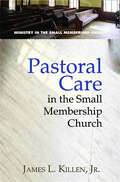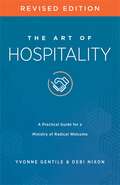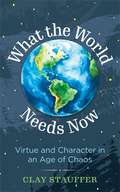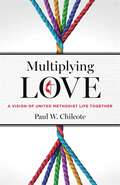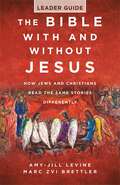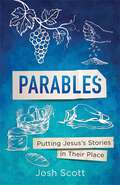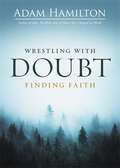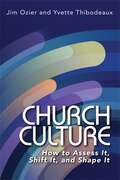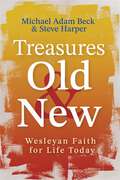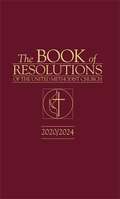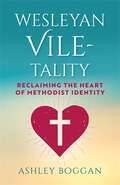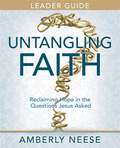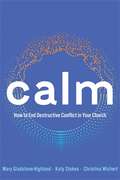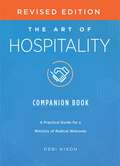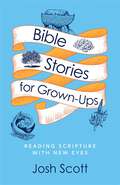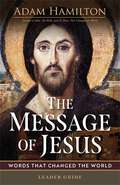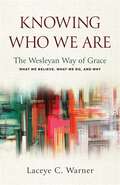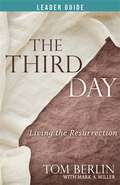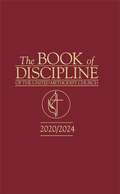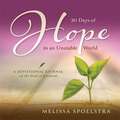- Table View
- List View
Pastoral Care in the Small Membership Church
by James L. Killen JR.An introduction to pastoral care for pastors of small membership churches.“If you spend your whole life serving small membership churches and doing it well, yours will have been a life well spent.” Small membership churches have a real advantage when it comes to incorporating people into a fellowship where they are known and where their needs are met. These churches and their pastors have an opportunity for excellence in this area, and should make the most of it. Good pastoral care can be the key to effectiveness in all of the other ministries of the church.From getting acquainted with your congregation, weddings and funerals, picking up on subtle cues in a conversation to not-so-subtle conflicts, Killen shares insights from years of ministry in a small membership church setting.James L. Killen, Jr. is a retired elder of the Texas Conference, contributor to Circuit Rider, and author of Who Do You Say That I Am? A Personal Reader.
The Art of Hospitality Revised Edition: A Practical Guide for a Ministry of Radical Welcome
by Yvonne Gentile Debi NixonCreate a culture of radical hospitality that surprises and delights guests beyond their expectations.Engaging worship and intentional follow-up processes are important, but what compels guests to return to our churches is the warmth of our welcome and hospitality that goes beyond their expectations. In The Art of Hospitality, Yvonne Gentile and Debi Nixon guide you and your church creating radical hospitality that infiltrates the heart and culture of the entire congregation. Complete with key principles and proven techniques and strategies, this compelling and practical program will transform the way you do church, leaving guests surprised, delighted, and eager to return. This Revised Edition includes new insights and strategies for effective hospitality and welcome in all aspects of your digital and in-person ministry. This book is for pastors and other leaders in the church. Choose the Companion Book for everyone else in the congregation.
What the World Needs Now: Virtue and Character in an Age of Chaos
by Clay StaufferRedefine leadership and character.Discover a path to a more connected and meaningful life with What the World Needs Now. Written by Clay Stauffer, a seasoned pastor, professor, husband, and father, this book explores moral leadership, character, and values that transcend generational and cultural divides. With 30 concise chapters covering topics such as love, hope, diversity, and joy, Stauffer invites you to reflect on how we can improve our relationships, reshape culture, and build a sustainable future for generations to come. Blending Christian wisdom with universally accessible principles, the book illuminates the importance of virtues, emotional intelligence, and spiritual growth. What the World Needs Now inspires readers from all walks of life to embody values of decency, civility, and mutual respect.
Heaven and Earth Leader Guide: Advent and the Incarnation
by William H. WillimonWatch out. God is on the way.It’s not within our own power to make a fresh start. If we’re to have a future different from the past, it must come as a gift, something not of our devising. What we need is a God who refuses to be trapped in eternity, a God who not only cares about us but is willing to show up among us and do something with us, here, now.In Heaven and Earth: Advent and the Incarnation, Will Willimon introduces you to the God who does just that, bringing heaven to earth and changing everything. In Advent we celebrate and anticipate the earth-shaking, life-transforming good news that God is coming to us. Watch out. Get ready. God is on the way.The Leader Guide contains everything needed to guide a group through the four-week study, including session plans, activities, discussion questions, and multiple format options.Additional components for the four-week small group study include the book and DVD/Video Sessions featuring Will Willimon.
Multiplying Love: A Vision of United Methodist Life Together
by Paul W. ChilcoteA Vision of United Methodist Life Together.Our world needs love during these desperate days of radical polarization and division. Our United Methodist churches yearn to embrace love more completely because God first loved us. Our “faith” (including doctrine) is important; Christian “hope” (including renewal) is important; “love” of God and neighbor is more important. Multiplying Love underscores what matters most and stands in contrast to divisive misreadings of essential Methodist teachings. Chilcote helps us embrace anew the Wesleyan vision of love of Jesus as central to what we believe and how we live.When I finished Multiplying Love, I found myself jumping up and down shouting, “Yes, yes, yes! Gosh, do we need this!” We are at a remaking moment in the church. Dr. Chilcote beautifully articulates the deeper theological vision that beckons and sustains us. Multiplying Love helped me more thoroughly embrace the kind of loving people we are hoping to become. That’s what it’s all about to me, and this book nails it!—Rev. Christy Allen Holden, co-creator of The Channel UMC, a new hybrid community of faith (@christyallenholden)Every United Methodist pastor would do well to invite their church council to read Paul Chilcote’s brief and powerful Multiplying Love. It recalls the power of the Wesleyan approach to the gospel and makes a compelling case for the future of The United Methodist Church. I loved this book!—Rev. Adam Hamilton, Kansas pastor and author of Wrestling with Doubt, Finding Faith
The Bible With and Without Jesus - Leader Guide: How Jews and Christians Read the Same Stories Differently
by Amy-Jill Levine Marc Zvi BrettlerScholars show how Jews and Christians read the same texts differently.The leader guide contains discussion questions and session plans for the study. It includes opening and closing prayers, optional activities, and weekly session goals. This leader guide, participant guide, and DVD are everything needed for an engaging study for your small group.In this Bible study based on their book, The Bible With and Without Jesus, esteemed Bible scholars and teachers Amy-Jill Levine and Marc Zvi Brettler take readers on a guided tour of the most popular Hebrew Bible passages quoted in the New Testament to show what the texts meant in their original contexts and then how Jews and Christians, over time, understood those same texts. Passages include the creation of the world, the role of Adam and Eve, the Suffering Servant of Isaiah, the book of Jonah, and Psalm 22, whose words, “My God, my God, why have you forsaken me,” Jesus quotes as he dies on the cross.Comparing various interpretations – historical, literary, and theological - of each ancient text, Levine and Brettler offer deeper understandings of the original narratives and their many afterlives. They show how the text speaks to different generations under changed circumstances, illuminating the Bible’s ongoing significance. By understanding the depth and variety by which these passages have been, and can be, understood, The Bible With and Without Jesus does more than enhance our religious understandings; it helps us to see the Bible as a source of inspiration for any and all readers.
Parables: Putting Jesus's Stories in Their Place
by Josh ScottRead the stories of Jesus in a new light.When Jesus taught in parables, he was doing more than telling simple morality tales. His stories were grounded in the world in which he lived and his vision of the Kingdom of God. This book explores six parables that give us a window into Jesus’s message and movement, and, once they are heard in their own context, ask what they might mean for us today. Parables include: the New Wine and Wineskins, the Mustard Seed, the Leaven, the Wedding Party, the Workers in the Vineyard, and the Wicked Tenants.Other components for the study include a leader guide and teaching video are available.
Give Up Something Bad for Lent: A Lenten Study for Adults
by James W. MooreWrap your arms around the Good News for Lent.During Lent each year, Christians give up something as an act of sacrifice and spiritual discipline. Often it is something like chocolate, knowing that after Easter Sunday they can once again enjoy what they have given up. James Moore challenges readers to take it further—to give up something spiritually that they would be better off not doing. He invites all to seek God's help to focus on eliminating one habit or attitude that is destructive. Imagine giving up envy, jealousy, self-pity, apathy, procrastination, gossip, resentment, or negative thinking, how much better life would be.The forty days of Lent are ideal to use this study and prepare to give up something bad while preparing to fully embrace the Good News of Easter. Study includes seven sessions, one for each Sunday in Lent and Easter Sunday. Each session features a Scripture reference, a personal reading, questions for personal reflection or group study, and closing prayer.
Wrestling with Doubt, Finding Faith
by Adam HamiltonDoes your faith make room for questions?Everyone has doubts. Where is God when bad things happen? Does God hear our prayers? Is there a heaven? How can we know? Often, we treat such questions as the enemy of faith. But uncertainty doesn’t mean our belief is lacking. Doubt can be a path to a deeper, richer encounter with God. In Wrestling with Doubt, Finding Faith, join best-selling author and pastor Adam Hamilton as he discusses some of our most significant sources of doubt and shows how a steady trust in God can emerge from them. You will delve into questions like: “Does God exist? How can I know?” “Is the Bible true?” “Why do prayers go unanswered?” Hamilton approaches these sources of doubt with honesty and insight, drawing on the rich wisdom of the Bible, Christian tradition, and his experience walking with thousands of people on their spiritual journeys. Whether you’re a longtime Christian or someone brand new to faith, this book will lead you to a trust in God that gives you the courage to ask tough questions. Though you may wrestle with doubt, you’ll discover a faith that—rather than providing simple answers—includes belief and trust as well as uncertainty and mystery. The book can be used anytime throughout the year and can be read alone, used by small groups, or as an outreach gift for visitors. Components include a comprehensive Leader Guide, a six-session DVD featuring Adam Hamilton (with closed captioning), and a digital worship and sermon series, making this perfect as a group study and churchwide program done throughout the year.
For Justice and Enduring Peace: One Hundred Years of Social Witness
by Jessica Mitchell SmithA look at the Methodist tradition of social witness.Since the beginning of the Methodist movement, “Methodists” have spoken to the issues of the day as an expression of the Wesleyan commitment to social holiness. The General Board of Church and Society upholds the Wesleyan commitment to social holiness through witnessing to just social policies and practices. This 100-year commemorative book will utilize archival materials from the agency’s historic publications to tell the story.
Church Culture: How to Assess It, Shift It, and Shape It
by Jim Ozier Yvette ThibodeauxLearn to understand culture and implement positive change. A church’s culture is the launchpad for everything a church does, the starting point for every ministry. If the culture is “off,” everything else will be out of kilter. Church Culture equips every pastor and leader with the tools necessary for culture change. Authors Ozier and Thibodeaux, both experts in this area of church leadership, teach the basic concepts so readers can understand what culture is and why it’s so crucial. Even more importantly, they provide a step-by-step process leaders can use to diagnose and gently shift the culture in their church. For some churches, wholesale change is in order, but most need only to make some crucial adjustments. The book provides a full set of tools for implementing the process in any setting. The pastor's top priority is creating and maintaining the church’s culture; Ozier and Thibodeaux make the tasks easy to understand and show leaders how to proceed capably and carefully.
Being United Methodist Christians: Living a Life of Grace and Hope
by Andy Langford Sally Langford Ann Langford DuncanLearn what it means to be a United Methodist Christian.How may we describe United Methodists? Where do we come from? What do we believe? How do United Methodists act? What are our distinctive characteristics? What is required to be a member of our denomination? How do we grow as disciples of Jesus Christ within this great communion?In this resource, we offer answers to these questions and others in broad strokes as we describe our United Methodist Church. We will introduce you to how United Methodists live and think as followers of Jesus Christ.The United Methodist Church possesses the characteristics of many other Christian traditions but has its own distinctive profile. Our denomination combines knowledge and vital piety, believing that serious theological reflection and spiritual practices are both part of the Christian life. United Methodists link personal and social holiness, expecting high personal integrity and deep concern for social justice. We are both evangelical and sacramental, showing concern for people who have not yet accepted Jesus Christ as Savior and honoring the transforming power of Baptism and Holy Communion. We welcome people with many different theological perspectives. Finally, United Methodists are both local and connectional, expressing our faith in local congregations, regional associations, and global missions, so that we might do more together than any of us could do separately.This book will help readers:· hear and claim for themselves the story of God’s love, God’s redemption, and God’s ongoing presence and power through Jesus Christ.· explore and claim for themselves the unique beliefs and emphases of United Methodist Christians.· identify ways to live day by day as United Methodist Christians as individuals and in community with other Christians.We invite you to claim for yourself the continuing story of God’s mighty acts of creation, redemption, and power through Jesus Christ within our great denomination. As you begin or continue to see yourself within this living, dynamic part of the universal body of Jesus Christ, we invite you to live, be, and grow as a United Methodist Christian.The book includes reflection questions. Supplementary resources include a downloadable Sermon, Worship, and Study Series outline.
Treasures Old and New: Wesleyan Faith for Life Today
by Steve Harper Michael Adam BeckThe way forward requires both old ways and new ways!Step into the world of Wesleyan beliefs and practices with this small, insightful, and impactful book! Join the Wesleys on their journey through early Methodism, and unlock hidden treasures that are still relevant today. Harper and Beck expertly guide readers towards a new era of Christian experience, combining old traditions with modern approaches for a revitalized church community. With its compact size, this book is perfect for leaders looking to unite their congregations around Methodist identity and future direction. Don’t miss out on this essential resource for shaping the next chapter in your faith journey!This book is a must-read for anyone in the Wesleyan faith stream, those involved in fresh expressions and other unconventional faith communities, and leaders within Wesleyan communities. Discover the heart of Methodist tradition, envision its relevance today, and boldly share these timeless treasures and new visions with others.
The Book of Resolutions of The United Methodist Church 2020/2024
by No Proposed ContributorsUnited Methodist take a stand, make a difference, and shape a better future.Discover the power of an active faith as United Methodist in your daily life with The Book of Resolutions. This new edition offers models for making a real impact on the world around us, as decided at the latest General Conference.Explore over 200 carefully curated positions on a wide range of subjects, conveniently organized into seven sections:The Natural WorldThe Political CommunityThe Nurturing CommunityThe World CommunityThe Social CommunityThe Economic CommunityOther ResolutionsWith a fully indexed format, finding the information you need is a breeze. Whether you're searching by resolution title, Scripture reference, or topic, this book has you covered.Available in English only.
Wesleyan Vile-tality: Reclaiming the Heart of Methodist Identity
by Ashley BogganLearn what it means to “submit to be more vile” for today’s Methodists.Wesleyan Vile-tality calls us back to the roots of our identity. Centered on the moment John Wesley “submitted to be more vile" in spreading the love of God to all people, Ashley Boggan argues that Wesleyan vile-tality is at the core of who we are as Methodists. As rule-benders, rabble-rousers, and outcast-embracers, those early Methodists stood out and stood up. She traces how that original identity was lost as the predecessor denominations to The United Methodist Church grew and began to embrace respectability over “vile-tality.” In an accessible and engaging account of a fascinating history, these stories of our past call us to understand who we were, question who we are, and reclaim who we should be. Each chapter includes questions for personal reflection or group study.
A Wesleyan Spiritual Reader
by Rueben P. JobA Wesleyan Spiritual Reader provides resources for a 26-week devotional experience. The volume includes Scripture, spiritual readings (primarily quotes from the writings of John Wesley), and an essay by the author. This material is woven into a pattern for daily prayer and reflection. This devotional experience will lead readers to live with Wesley's ideas and spirit as a window or vehicle for reaching God. Among the 26 themes explored are: Scriptural Christianity; Life in Christ; Reaching Out to the Poor; The Means of Grace; Holiness of Life; Justifying Grace; The Ministry of All God's People; Sanctifying Grace; and God's Love and Ours. While intended for devotional use by both clergy and laity, pastors will also find this a helpful resource for sermon preparation. This wonderful guide to deeper spirituality will become a cherished companion for all who seek to grow in faith and knowledge of God.
Untangling Faith Women's Bible Study Leader Guide: Reclaiming Hope in the Questions Jesus Asked
by Amberly NeeseYour questions can lead to a deeper faith and trust in God.Have you ever felt you struggled to find your faith footing? Join Amberly Neese in she explores the questions Jesus asked as a way to reclaim that faith. Chapters explore our own questions like Can God Be Trusted? and How Can I Grow in Faith. Amberly’s unique humor and wit help the whole group find their way through deep and rich issues of personal faith, doubt, and growth.Components for this six-week Bible study, each available separately, include a Participant Workbook with daily reading and reflection, a full Leader Guide to help plan full group sessions, and video sessions with six 20 to 25-minute segments (with closed captioning).
Calm: How to End Destructive Conflict in Your Church
by Mary Gladstone-Highland Kathryn E. Stokes Christina WichertGuide your church to proactively make decisions and deal with conflict.Calm: How to End Destructive Conflict in Your Church is a guidebook written for United Methodist churches and church leaders to help them proactively make decisions and deal with conflict.This book equips pastors and other leaders with the skills and tools necessary to engage in critical conversations that lead to healthy communities--churches that remain God-focused in times of conflict and tension. In addition to the four Modules, Calm includes the practical resources pastors, judicatory leaders, and others will need to lead congregations through the Modules.The Modules contain step-by-step instructions for planning and facilitating the Module sessions. They include detailed instructions and helpful tips for leading people through the Calm process of group activities, discussion, reflection, and times of worship. The book is a complete guide for leading this process, including instructions for the pastor and facilitator, helping to ensure success.The authors also provide clear adaptations for groups gathering virtually – an inescapable reality in the life of today's church. These adaptations both underscore and equip groups to take special care while engaging in the sensitive nature of conflict work in a virtual space.
The Art of Hospitality Companion Book Revised Edition: A Practical Guide for a Ministry of Radical Welcome
by Debi NixonCreate a culture of radical hospitality that surprises and delights guests beyond their expectations.The Art of Hospitality guides you and your church to creating a ministry of radical hospitality. While the main book is intended for pastors and church leaders, this Companion Book is designed for the whole congregation, to equip and inspire everyone to embrace a ministry of welcome. Engaging worship and intentional follow-up processes are important, but what compels guests to return to our churches is the warmth of our welcome and hospitality that goes beyond their expectations. In The Art of Hospitality, Yvonne Gentile and Debi Nixon guide you and your church creating radical hospitality that infiltrates the heart and culture of the entire congregation. Choose The Art of Hospitality main book for pastors and other leaders in the church. Choose the Companion Book for everyone else in the congregation.
Bible Stories for Grown-Ups: Reading Scripture with New Eyes
by Josh ScottRead the Bible for the first time – again. In Bible Stories for Grown-Ups: Reading Scripture with New Eyes pastor Josh Scott looks at familiar Bible stories and reveals new details and interpretations for an adult audience. This six-week Bible study will consider stories many read as children including Noah's Ark, the binding of Isaac, Jonah and the big fish, Jesus and Zacchaeus, Jesus healing a blind man, and the parable of the talents. Scott reimagines these stories and opens new visions for readers to understand well known pieces of Scripture in our current cultural environment.The book can be read alone or used by small groups, and can be used anytime throughout the year. Additional components include video teaching sessions featuring Josh Scott, and a comprehensive leader guide, making this perfect as a six-week group study done throughout the year.
The Message of Jesus Leader Guide: Words That Changed the World
by Adam HamiltonA fresh encounter with the words of Jesus.This Leader Guide contains everything needed to facilitate a 6-week study on The Message of Jesus, by Adam Hamilton. Helps include opening prayers, summaries, discussion questions and more.More than 3 billion people claim to follow Jesus. But aside from a few verses, how many actually know what he taught? In fact, much of what people think Jesus taught, he never said. In this six-week study, pastor and best-selling author Adam Hamilton explores six of the most important themes in Jesus's teachings, why they matter, and how they speak to us today. The book will explore Jesus’s preaching on the Kingdom of God, the Sermon on the Mount, the parables, the “I am” sayings in John, and more. Jesus's message is not only life-changing, but world-changing. Join Adam Hamilton in studying The Message of Jesus: Words That Changed the World. Other components for the study include a leader guide, and teaching video are available.
Knowing Who We Are: The Wesleyan Way of Grace
by Laceye C. WarnerDiscover what sets United Methodism apart. In this book, Laceye C. Warner invites you to a richer understanding of Wesleyan Christianity so you can have a clear sense of identity, better express your own beliefs, and deepen your connection with The United Methodist Church. She introduces you to important values and characteristics that make the Wesleyan way distinctive, including emphasizing God’s grace for all and sanctification as tangible transformation in your life, your community, and all creation. You’ll see how The United Methodist Church today is deeply rooted in the Christian tradition and a legacy of care, compassion, and active response to injustice in the world. And you’ll find that Christian faith in the Wesleyan tradition holds together personal faith and community life, along with a commitment to justice through ministry and service. Pick up this book and study it with your small group and discover a way of being Christian that fills you with joy, moves you to follow Jesus wholeheartedly, and spurs you to live with compassion and grace. The book can be read alone or used by small groups anytime throughout the year. Components include video teaching sessions featuring Laceye Warner and a comprehensive Leader Guide, making this perfect as a six-week group study. A companion book, Who We Are and What We Believe: 50 Questions about The UMC, is also available.
The Third Day Leader Guide: Living the Resurrection
by Tom Berlin Mark A. MillerOn the third day, he rose again.The Leader Guide contains everything needed to guide a group through the six-week study, including session plans, activities, discussion questions, and multiple format options. In The Third Day: Living the Resurrection, Tom Berlin uses his gifts of storytelling and understanding the Scriptures to connect the reader to the experiences of several individuals around Jesus in his final days, focusing on new life and redemption rather than loss.Join Peter, Mary Magdalene, and Thomas as they feel the despair of losing Jesus and the surprise and joy that awaits them in the resurrection. This study traces events around these characters, along with Paul and the disciples at Emmaus, and how the resurrection transforms their lives.Additional components include the book, The Third Day: Living the Resurrection, and video teaching sessions featuring Tom(with closed captioning).
The Book of Discipline of The United Methodist Church 2020/2024
by United Methodist ChurchThe Guide to the Historical Record and Up-to-Date Policies and Practices for Governance of The United Methodist Church. This essential volume includes The United Methodist Church's current law, doctrine, administrative guidelines, and organizational procedures. Each General Conference amends The Book of Discipline, and the actions of the 2024 General Conference are reflected in the quadrennial revision. Freshly updated to reflect the latest General Conference actions, the new Discipline features a comprehensive list of bishops spanning from our early leaders, Thomas Coke and Francis Asbury to the 2024 episcopal elections. Additionally, it includes a revised historical statement, an expanded index, and is divided into six informative sections: The Constitution General Book of Discipline Doctrinal Standards and Our Theological Task The Ministry of All Christians Social Principles Organization and Administration
30 Days of Hope in an Unstable World: A Devotional Journal on the Book of Jeremiah
by Melissa Spoelstra30 devotions for learning to surrender to God’s will and rest your hope in Him alone.Finding hope can seem like a distant dream in a world filled with uncertainty and challenges. But in the Book of Jeremiah, God offers a message of hope that transcends the chaos of our daily lives, showing us that intentional living is possible even in an unstable world.Through this 30-day journey, you will learn how to conquer fear, worry, and doubt by surrendering your will to God and trusting Him. Each day includes Scripture, insightful readings, a prayer or prayer exercise, and writing prompts with space for journaling based on the day’s theme.Whether used alongside the Jeremiah: Daring to Hope in an Unstable World Women’s Bible Study or on its own, this devotion journal is a beautiful tool for those seeking to embark on a journey of hope through the teachings of Jeremiah.
